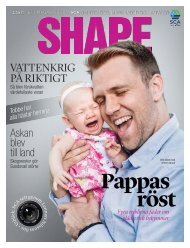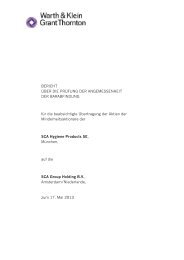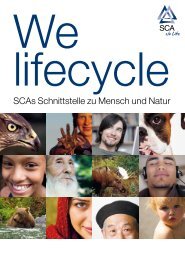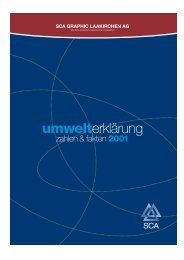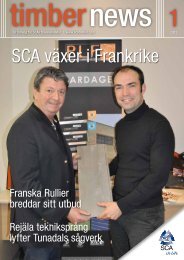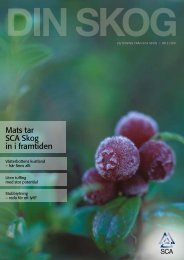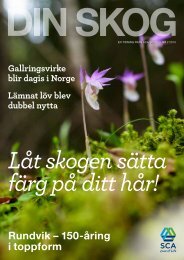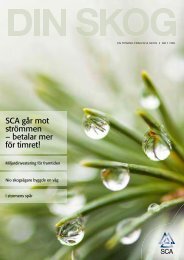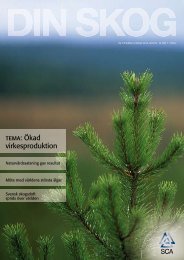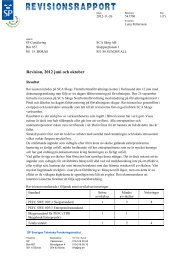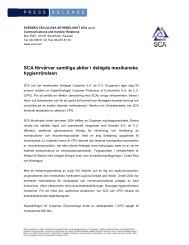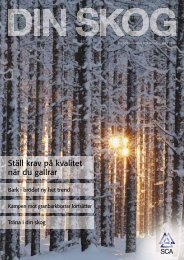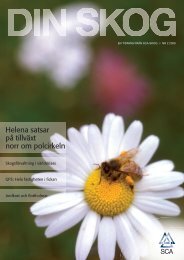SHAPE Magazine 1 / 2013 - SCA
SHAPE Magazine 1 / 2013 - SCA
SHAPE Magazine 1 / 2013 - SCA
Create successful ePaper yourself
Turn your PDF publications into a flip-book with our unique Google optimized e-Paper software.
corporate leaders, Nobel laureates and politicians,<br />
like Gro Harlem Brundtland, the former<br />
prime minister of Norway and former General<br />
Director of the World Health Organization.<br />
You were ranked as the most infl uential<br />
person in Sweden on environmental issues<br />
in 2012. Do you feel infl uential?<br />
No, defi nitely not as infl uential as many people<br />
think when you get an honor like that. Giving a<br />
research director an award is one way to emphasize<br />
that science is really important in decisionmaking<br />
processes.<br />
But you still manage to get 17 Nobel laureates<br />
to come when you invite them to an environmental<br />
meeting. How do you arrange that?<br />
As a research director, I can naturally play<br />
my role and do the best we can to be a bridge<br />
between science and society. But it’s in large part<br />
because we are one of the world’s leading cross-<br />
disciplinary environmental research centers.<br />
Then it’s easy to call a meeting.<br />
You wanted to save the world even when you<br />
were little. Where does this early conviction<br />
come from?<br />
I grew up in Brazil, and as a Swede I was really<br />
proud of the environmental campaign “Keep<br />
Sweden Tidy.” When you live in São Paulo, where<br />
it’s easy to see problems like garbage and poverty,<br />
then your commitment grows. But it wasn’t<br />
like I woke up as a fi ve-year-old and said I wanted<br />
to save the world. Rather, my genuine environmental<br />
commitment fi rst came when I started<br />
studying at the Swedish University of Agricultural<br />
Sciences in Ultuna and began to understand the<br />
links between world food production, global environmental<br />
change and sustainable development.<br />
When there are too many environmental<br />
disasters and failed summits, how do you<br />
manage to keep fi ghting?<br />
I am inspired by my research colleagues. We<br />
have an incredible work environment here, with<br />
people who devote all their energy every day to<br />
research on sustainable solutions. We don’t go<br />
around being depressed. Instead we focus on how<br />
we can carry this knowledge forward.<br />
Then it’s always inspiring to see the good<br />
examples found in sustainable management, for<br />
instance, trying to improve the situation for the<br />
the coral reefs or the status of cod in the Baltic Sea.<br />
Are you an environmental off ender in any area?<br />
We’re all environmental off enders. It’s frustrating<br />
– you wish you could be the perfect person, but<br />
STOCKHOLM<br />
RESILIENCE CENTRE<br />
The Stockholm Resilience<br />
Centre is an international cross-<br />
disciplinary research center<br />
where people conduct research<br />
on social-ecological systems,<br />
with humans and nature studied<br />
as an integrated whole. The aim is<br />
to gain new knowledge and tools<br />
that enable long-term sustainable<br />
production of ecosystem<br />
services and stronger resilience<br />
for human well-being.<br />
HOW CAN WE<br />
CONTRIBUTE?<br />
Take in new knowledge<br />
and share it<br />
with friends. An<br />
understanding of the<br />
global environmental<br />
risks and of the possibilities<br />
of adjusting<br />
to sustainable societies<br />
is all-important<br />
for rapid, positive<br />
change.<br />
Convert to renewable<br />
energy. It’s easier<br />
today than you think.<br />
Change your transportation<br />
habits.<br />
Ride a bike and take<br />
mass transit. Make<br />
demands for better<br />
access to bike paths,<br />
trains and buses.<br />
Consumption – try to<br />
buy organic.<br />
10 QUESTIONS<br />
“ We don’t go around being<br />
depressed. We focus on<br />
how we can carry this<br />
knowledge forward.”<br />
it’s really hard in a modern society. We do as much<br />
as we can by having wind-powered electricity and<br />
geothermal heating. But we consume just like a<br />
typical Swedish family, we eat meat, we drive to<br />
the mall and I fl y a lot in my job. So both in terms<br />
of consumption and transportation, my record<br />
isn’t perfect either.<br />
You did the Vasaloppet (a Swedish cross-country<br />
ski race) in 1996 representing the African<br />
country of Niger. How did you prepare for that?<br />
I did roller skiing. I was studying for my PhD<br />
in Niger, and one morning I saw a car that had<br />
a Vasaloppet sticker on it. It turned out to be a<br />
Danish environmental worker who was also crazy<br />
about skiing. We became good friends, and we<br />
wrote a letter to Vasaloppet’s management saying<br />
that we wanted to race for Niger and asked if<br />
they could cover the cost of our participation. We<br />
promised that we would only train on roller skis in<br />
preparation for the race. There was also a hidden<br />
agenda. We wanted to make people aware of the<br />
challenges faced by regions with a water shortage.<br />
So I skied in a Niger Tuareg caftan and was interviewed<br />
on TV at each refreshment station.<br />
<strong>SCA</strong> <strong>SHAPE</strong> 1 <strong>2013</strong> 17



